From close-to-home holidays to personalized experiences, the way people travel is evolving. Discover the travel trends for 2025.
It’s holiday season, and people are ready for a fresh wave of travel, fun, and festivities. But the way people travel and see the world is already changing. The factors influencing travelers’ choices are evolving—and we anticipate a new set of travel trends to shape the travel industry in 2025.
At Simon-Kucher, we have identified six emerging travel trends that travel providers can leverage for growth in the new year. Our 2024 Global Travel Trends Study, which surveyed more than 7000 respondents for this Fall/Winter edition, was carried out across Europe, the US, and the UAE. The unanimous good news? Travel remains a key part of many people’s plans.
In this article, we share the new travel trends and why they will matter in the coming year.
1. Economy travel is the new norm
Affordable, budget-friendly trips is one of the most defining travel trends for 2025. Travel remains a high priority for most people, but a significant number (29 percent) are already looking for ways to reduce their travel expenses. And accommodation and transportation are where most people are looking to offset travel costs. Our research reveals that more and more travelers prioritize affordability over luxury when choosing holidays accommodations. This trend is especially prevalent in young travelers. For instance, 45 percent of Millennials and 40 percent Gen Zers actively reduce travel costs by opting for budget-friendly hotels. In contrast, just 32 percent of Baby Boomers are prepared to compromise their comforts; a significant percentage would pay for premium accommodations.
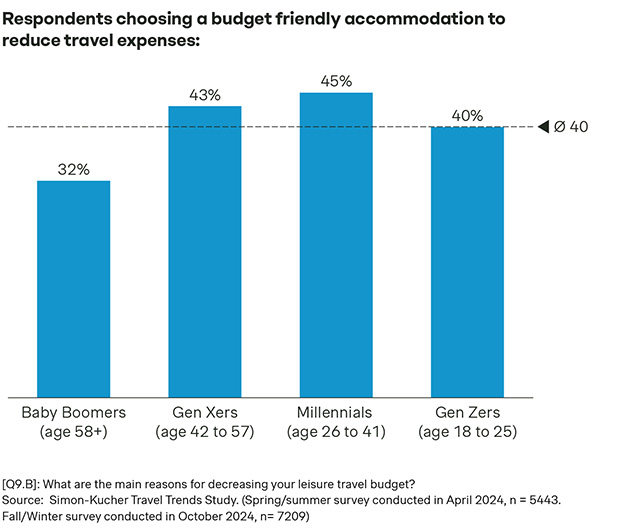
2. People are opting for escapes closer to home
In line with the trend of reducing expenses and slowdown in travel budget growth, travelers are now choosing to holiday closer to home. Over 20 percent of respondents report scaling back their travel budgets and focusing on domestic or nearby holiday destinations. In this development, Americans make up the largest group at 37 percent, followed by the UAE and the UK at 28 and 27 percent, respectively. Travel providers can tap into this growing trend by offering budget-friendly packages that highlight local experiences or make nearby destinations more appealing by catering to cost-conscious and environmentally aware travelers.
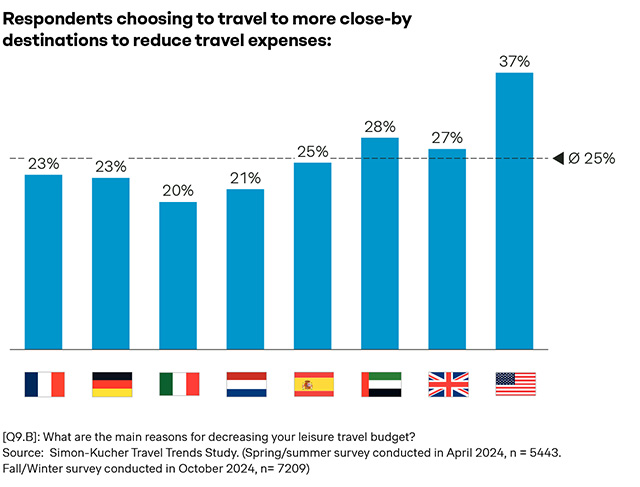
3. Boom in luxury tourism will be driven by certain countries
Luxury tourism is on the rise. In 2025, travelers will demand higher quality accommodation and flights that are significantly better than the current standard. But not all markets will experience the same growth. This new surge is rooted in source markets like the Middle East, Asia, and the US. In fact, the UAE is a top destination for hotel chains, airlines, and transport companies looking to attract high-end travelers. According to our survey, appetite for luxury travel is most prominent in the UAE, the US, and the UK.
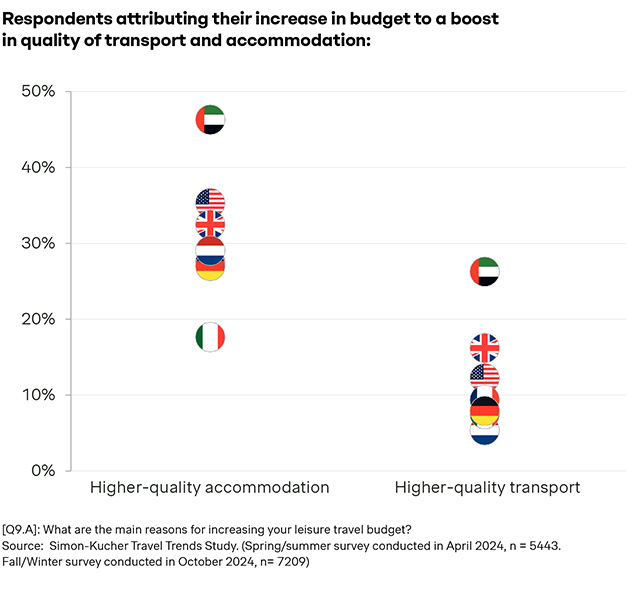
4. Event and experiential travel is on the rise
Today’s traveler(s) are after experiential travel and the most notable examples of that are trips linked to music or sports events. In our recent study we found that 56 percent of live music fans are willing to travel to a different country to see their favorite musician. Nearly two-fifths of respondents are prepared to pay a 25 percent premium for accommodation and transportation.
Equally, sports tourism is flourishing. 40 percent of sports fans are willing to spend more to follow their favorite events. During sports travel, fans increase their budget by 31 percent for hotels and 28 percent for transportation.
Driven by music and sports, fans are not only willing to pay more for their hotels and flights but also ready to compromise on quality and comfort to follow their hobbies. Travel providers should focus on integrating experiences to offer the best value and attract future travelers.
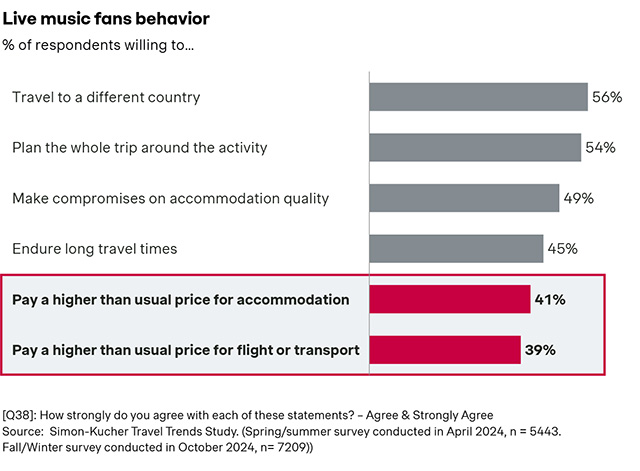
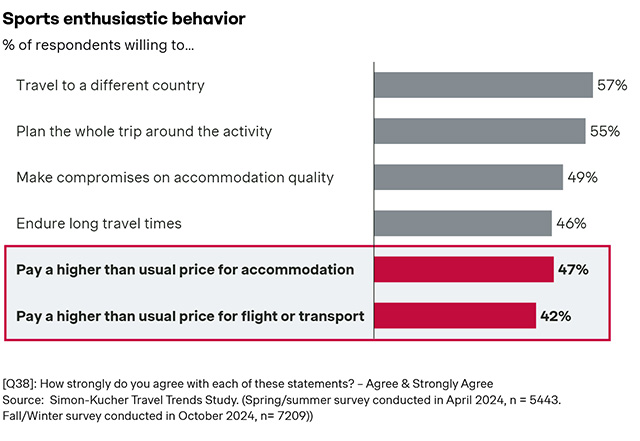
5. Overcrowding is a real threat for tourism sustainability
The return of travel and tourism, after the pandemic lockdowns and the popularity of budget traveling, has been explosive. But overtourism is now a serious concern. More than half of our survey respondents acknowledged overcrowding issues in certain locations, like Barcelona, Amsterdam, and Athens. Travelers intend to avoid overcrowded destinations in the future, with over 20 percent already canceling trips due to these concerns.
One of the ways to address this is by increasing prices in these popular but overcrowded destinations. But with travelers already resistant to paying higher accommodation prices, excessive surges could lead to lower occupancy rates, among other potential risks. According to our research, off-peak travel incentives could be the most effective way to help alleviate the issue of overtourism. Almost 40 percent of respondents picked incentives like discounted rates and special promotions. Travel providers could utilize such incentives to spread out visitors and balance tourism across the year, also helping to boost off-season occupancy.

6. Sustainable travel is in for the long haul
We see a growing number of travelers making conscious decisions to integrate sustainability in their travel choices. Eco-conscious travelers are prepared to spend more to offset their carbon footprints: 35 percent would pay up to 27 percent more for greener flights and 43 percent would pay up to 34 percent more for eco-friendly accommodations. Travelers from the US, the UK, and Germany are most dedicated to sustainable travel solutions and are willing to pay extra to reduce their environmental impact. The bottom line is sustainable travel matters to travelers in 2025. And this creates new opportunities for tourism and travel providers.
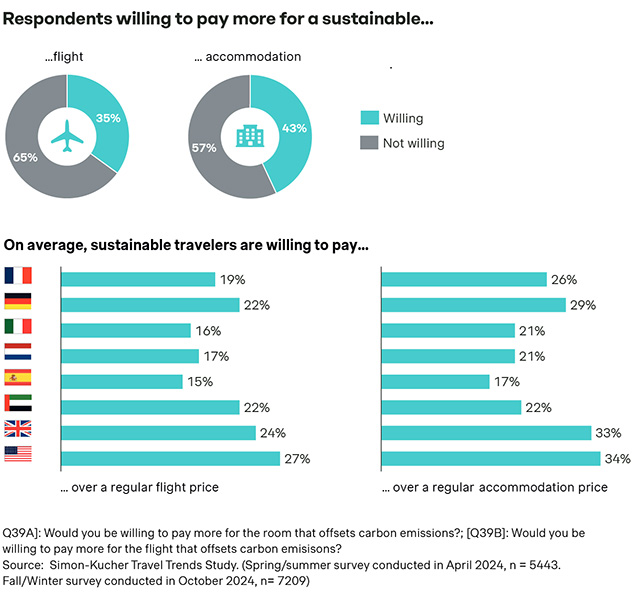
We can help you transform your travel offers
Are you ready to seize the opportunities presented by these six defining travel trends of 2025?
With over thirty years of experience in the global travel and tourism industry, our team of experts is perfectly positioned to help travel players adapt to industry trends and consumer needs. From crafting effective marketing strategies to product and pricing innovations that produce tangible outcomes, we have guided global businesses toward competitive, sustainable growth.
Reach out to us to explore how you can adopt these new travel trends effectively.
Thanks to Rodrigo Portillo for his contributions.
Form placeholder. This will only show within the editor



